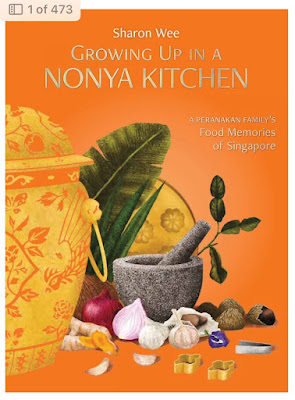 |
| Courtesy of Author |
About the Author:
Sharon Wee was born and raised in Singapore, graduating from the National University of Singapore. She worked for Mars Confectionery in Hong Kong and China in the 1990s. She has an MBA from New York University and resides in Manhattan where she trained at the French Culinary Institute. Her recipes have been featured in the New York Times and the Washington Post and she has given interviews about her Peranakan heritage. She chronicles her food experiences on Instagram @nonya.global. Sharon frequently returns to Singapore.
 |
| Courtesy of Author |
Synopsis:
This is a cookbook, and an intimate memoir, giving readers a sense of what it felt like to grow up in a Peranakan Chinese family ― descendants of local womenfolk and the earliest Chinese settlers to Southeast Asia.
As a fifth-generation Nonya (honorific for female Peranakans) from both sides of her family, Sharon Wee recollects her life in Singapore. She interviewed older relatives and recreated her mother’s personalized recipes, many orally passed down for generations.
Growing Up in a Nonya Kitchen was originally published in 2012. This updated edition includes revised recipes and cooking methods, with more detailed explanations and guidance for the young or unfamiliar cook to Peranakan food, spiced with a dose of humour. It also includes new contributions by subject experts on the heritage and beautiful cultural legacy of the Peranakans.
***
EC: Welcome to Asian Books Blog, Sharon. What an honour to have you. Thank you for sending me your wonderful cookbook, Growing Up In A Nonya Kitchen; it’s refreshingly novel that you’ve embedded a memoir plus cultural commentary on the world of the Peranakans that expand beyond cuisine. Why did you choose this blended approach?
SW: When I considered publishing my book in the early 2000s, I was cognisant of the fact that there had already been a few established Peranakan cookbooks. Yet, very little was told about the significance of the food and how we ate – the moments we shared, the celebrations, the customs.
I wove the memoir in to give readers a sense of our culture, and I revolved it around my mother’s life because she was from a vanishing generation of women whose lives focused on raising a family, keeping a home, all while being compromised in their education. Cooking was their currency. I’d like to think that this format of a cookbook memoir with headers elaborating on the dish, was not as common as what you see these days.








